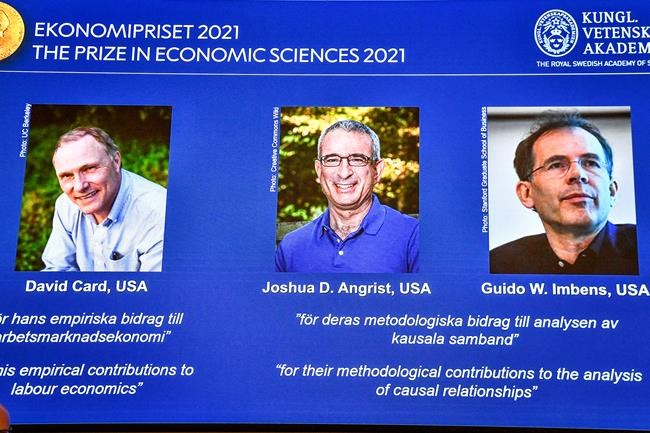Canadian David Card one of three U.S.-based economists to win Nobel Prize
Advertisement
Read this article for free:
or
Already have an account? Log in here »
To continue reading, please subscribe:
Monthly Digital Subscription
$0 for the first 4 weeks*
- Enjoy unlimited reading on winnipegfreepress.com
- Read the E-Edition, our digital replica newspaper
- Access News Break, our award-winning app
- Play interactive puzzles
*No charge for 4 weeks then price increases to the regular rate of $19.00 plus GST every four weeks. Offer available to new and qualified returning subscribers only. Cancel any time.
Monthly Digital Subscription
$4.75/week*
- Enjoy unlimited reading on winnipegfreepress.com
- Read the E-Edition, our digital replica newspaper
- Access News Break, our award-winning app
- Play interactive puzzles
*Billed as $19 plus GST every four weeks. Cancel any time.
To continue reading, please subscribe:
Add Free Press access to your Brandon Sun subscription for only an additional
$1 for the first 4 weeks*
*Your next subscription payment will increase by $1.00 and you will be charged $16.99 plus GST for four weeks. After four weeks, your payment will increase to $23.99 plus GST every four weeks.
Read unlimited articles for free today:
or
Already have an account? Log in here »
Hey there, time traveller!
This article was published 11/10/2021 (1489 days ago), so information in it may no longer be current.
When the phone rang around 2 a.m. telling David Card that he won the Nobel Prize for Economics, the Canadian-born economist thought it was a stunt.
But when he saw the phone showing a Swedish number he thought maybe it wasn’t a joke after all.
“I have an old friend I met in ninth-grade English class,” he said with a chuckle at a news conference Monday.

“When the teacher threw a book at him, it hit me by accident. He is the kind of guy who would pull this stunt.”
Guelph, Ont., born Card, 65, was awarded one half of the prize, while the other half was shared by Joshua Angrist from the Massachusetts Institute of Technology and Dutch-born Guido Imbens, 58, from Stanford University.
Card, of the University of California at Berkeley, is being recognized for pioneering research on the labour market impacts of minimum wages, immigration and education. He is the first Canadian this year to win the award.
He got his undergraduate degree at Queen’s University in Kingston, Ont., and his PhD at Princeton.
Angrist and Imbens are being recognized for working out the methodological issues that enable economists to draw solid conclusions about cause and effect, even where they cannot carry out studies according to strict scientific methods.
The Royal Swedish Academy of Sciences said the three academics “completely reshaped empirical work in the economic sciences.”
“Card’s studies of core questions for society and Angrist and Imbens’ methodological contributions have shown that natural experiments are a rich source of knowledge,” said Peter Fredriksson, chair of the Economic Sciences Prize Committee.
“Their research has substantially improved our ability to answer key causal questions, which has been of great benefit for society.”
Card worked on research that used restaurants in New Jersey and in eastern Pennsylvania to measure the effects of increasing the minimum wage.
He and his late research partner Alan Krueger found that an increase in the hourly minimum wage did not affect employment, challenging conventional wisdom which held that an increase in minimum wage will lead to less hiring.
The award seemed bittersweet because Krueger died in 2019. Card paid him tribute.
“I really have to mention Alan Krueger, who was my co-author on many papers including the minimum wage paper that is cited by the Nobel Committee,” Card said.
“And I’m sure that if Alan was still with us that he would have been sharing this prize with me. I think I just have to bring that up.”
He also acknowledged those who helped him.
“I feel like my career has been greatly benefited from so many people,” Card said.
“My teachers, my students, my colleagues, the support of my wife, so, so many people have helped me along the way that I am not entirely sure that I should be the one person who is singled out for an award.”
Prime Minister Justin Trudeau congratulated Card in a statement late Monday.
He thanked him for “helping us to better understand the economy” in a way that benefits everyone around the world.
Card’s work on the minimum wage is one of the best-known natural experiments in economics. The problem with such experiments is that it can be difficult to isolate cause and effect. Natural experiments are studies based on observing real-world data.
He said he and his co-author Krueger faced disbelief from other economists about their findings.
“At the time, the conclusions were somewhat controversial. Quite a few economists were skeptical of our results,” he said.
But, he added that research builds slowly.
“The labour market or any economic phenomenon is always evolving.”
A particular piece of research may have some influence, but it takes “many, many years” and rethinking of how that evidence actually either confirms or contradicts existing wisdom, he said.
His advice to students and others is to not give up if results are not fully and immediately appreciated.
“Van Gogh never sold any paintings in his life,” Card said.
“So, if you want to take that as a possible way, you know, to think about your own work.”
— With files from Noushin Ziafati and The Associated Press
This report by The Canadian Press was first published Oct. 11, 2021.

